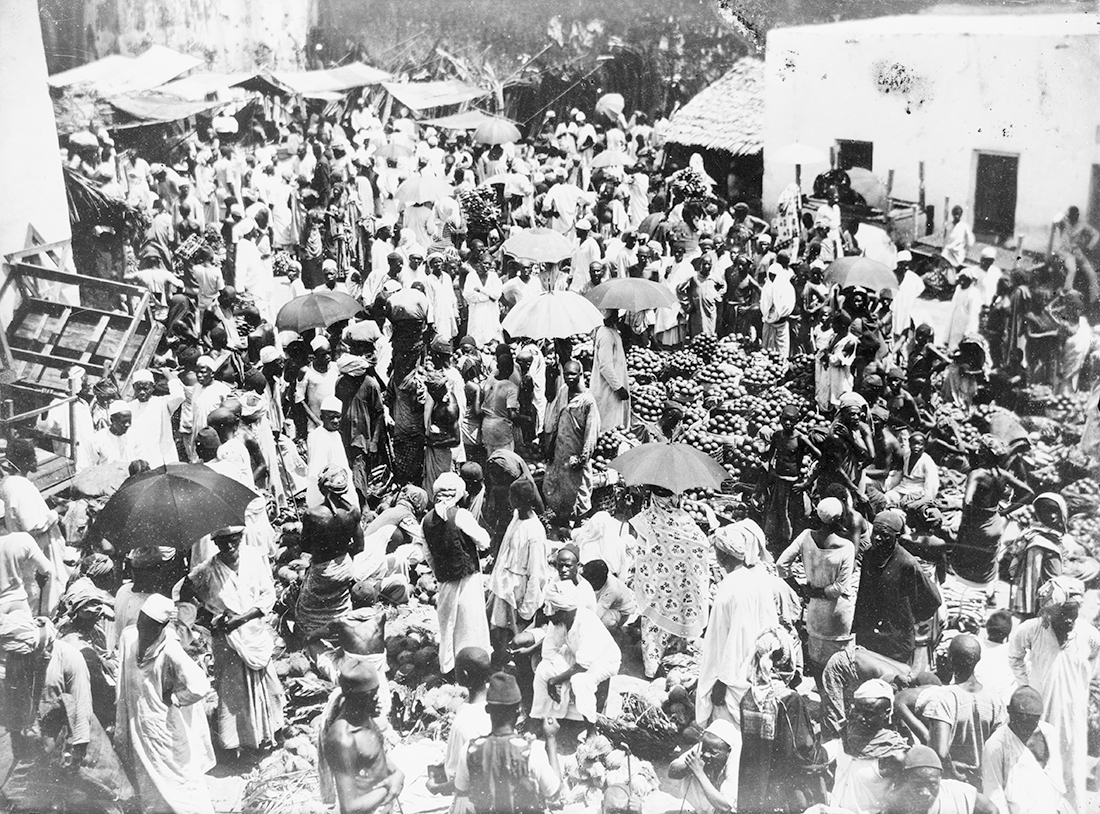
Fruit market at Zanzibar, 1890-1923 | Library of Congress | Public Domain
Over half of the contents on the Internet are written in English and the Web often threatens to unleash a cultural apocalypse that will put an end to the majority of the world’s languages. Africa is home to a third of the planet’s linguistic diversity, and despite the apparent vulnerability of its national languages, cultural activists are exploiting all the potential of the digital environment to maintain this cultural heritage. These include methods for learning and raising visibility and even bringing the Internet to people who are not reached by commercial developments.
If 54% of Internet contents are in English, what is happening with the rest of the 7,100 languages spoken around the world? The Internet seems to be a kind of steamroller at the service of English (and a small handful of other languages) and of linguistic homogenisation. The reality of the data shows that the Web has potential for unleashing this cultural apocalypse. However, by paying closer attention, it is possible to observe a not inconsiderable number of resistance initiatives, or even initiatives aiming to convert a threat into an opportunity.
The scenario for African languages is representative for different reasons. According to data from the Ethnologue project, practically one out of every three languages that is spoken in the world has African origins, in other words, the African continent houses some 30% of the planet’s linguistic diversity. At the same time, Africa is the region with the lowest Internet penetration, i.e. with the smallest current market. This panorama is getting worse. If we add the dearth of African technological production, it would seem that storm-clouds are approaching. And if we also take into account that none of the languages with African origins can presume to generate more than 0.1% of the content of the Internet, according to data from w3tech, then it seems that the new technological times and the digital era are sounding the death knell for the majority of the 2,144 languages that are spoken in Africa.
But in the midst of all this adversity, clues are appearing that challenge that fatalistic view. For example, the report from Funredes, the Internet observatory for linguistic and cultural diversity on the Internet, which in a fleeting but optimistic reference points out: “The best progression (in terms of presence in Internet contents) corresponds to African and Asian languages.” And at the same time, modest initiatives stand out that, from a position of cultural activism, defend the role of African languages or even, that are convinced of being able to use digital tools to guarantee the survival of these languages.
The association of Guinean bloggers, Ablogui, has a committee focusing on languages whose aim is to promote the generation of contents in some of the national languages. It is run by Tafsir Balde and he recognises that “the fact that around just ten languages monopolise 90% of Internet contents constitutes a threat for African languages”. However, far from a defeatist attitude this blogger affirms that “this is why necessarily we must promote multilingualism and ensure that contents are accessible in the largest number of languages possible, to preserve linguistic and cultural diversity”. Despite the certainty of the risk, Balde offers a positive analysis: “Based on my experience in the promotion of African languages, I think that the Internet represents an opportunity for them in the measure that the digital environment can offer more efficient tools for their expansion”.
A similar reading is made by Sinatou Adedje Saka, a Beninese journalist resident in France and one of the promoters of the Idemi platform, an instrument aiming to make African languages more visible through digital tools. “Starting from the basis that African languages are under threat, I believe that, objectively, Internet is an opportunity. The problem is that today Internet is directed by US corporations that have the monopoly of everything that is communicated, I am thinking of Google and Facebook, and that has denaturalised the original spirit of freedom and inclusion”, says the journalist ruefully. “They are private enterprises, with private interests, and you can’t trust in them to promote languages that do not generate financial returns”, she adds.
Despite this, Sinatou Adedje Saka is optimistic. “Beyond the discussion about problems of diversity in the digital space”, she asserts, “the Internet is an opportunity because it can unlock territories; it can make languages more visible; it can contribute new tools for them; and it opens up very interesting debates around the transcription of those languages”. “There is still a lot of work to do”, she affirms, “because the great machineries of the Internet only pay attention to whatever generates profits, but there is a really great potential for visibility and the connection of different circles for reflection, to overcome the barriers that they face in the digital world”.
One of the opportunities that opens up for culture in African languages is that of literature. One example of this dynamic is the initiative for the translation of the short story “The Upright Revolution”, by Kenyan author Ngũgĩ wa Thiong’o. What the Pan-African collective of writers Jalada originally launched as a celebration of African linguistic diversity has ended up spreading to languages from all over the world, many of them also minority languages, and has turned this story, originally written in Gikuyu, into one of the twenty-most translated tales of all time, available in 87 languages.
Moses Kilolo was head of this project as chief editor of Jalada and he explains that there is considerable literary production in African languages but that the main challenge (and damper) is publication. “It’s all business”, Kilolo recalls, remarking that publishers “will analyse the costs of publication of works in African languages and the return on the investment, so the figures may not always be attractive and will discourage writers and publishers alike”.
However, for this writer, who has experience of exploring unconventional forms of publication, “work published in African languages through digital platforms has increased in recent years”. And he notes two reasons: “The power of telling our stories in our own languages, as a source of natural pride and of preservation. And online publishing reduces costs significantly. All you need is an Internet connection, web hosting, writers and publishers and, hey presto, you have a nice online publication. Sharing it is relatively easy, because a lot of people have suitable devices and can access it from anywhere. And two of the main costs of publishing are eliminated: printing and distribution”, he concludes.
Kilolo, however, does not overlook the main drawback of this system: “It is very difficult to generate money online, although not impossible. The solution is a hybrid of printed and online publications. Greater access to online publishing will promote the goal of encouraging works written in African languages and will offer readers the opportunity to access them. The monetisation of these platforms will make it sustainable both for the writers and the platforms. Monetising the online platforms has its difficulties, but a hybrid focus with a printed publication is useful for earning more money and sustaining the entire industry”, Kilolo summarises.
Based on these examples and the enthusiasm of cultural activists, we can see how the digital environment is unfolding as an ally of African languages, through simple (or at least accessible) tools for learning them, and functionalities that take advantage of the attraction that the social networks have already demonstrated, putting it at the service of people who are not on the radar of the big companies, as well as tools that reduce language barriers.
Afrilangues.com, for example, is a website that offers the possibility of accessing classes in a dozen languages through different formats. Egbe is an application that enables people to learn (or at least get to know more about) Gen (also called Guin and Mina), a language spoken by more than 300,000 people in Togo and Benín. Similar is “Je parle le bassa 2.0”, which combines a mobile app and a YouTube channel to promote the learning of a language spoken by two million people, above all in Cameroon.
Elsewhere, African developers and entrepreneurs are trying to make need a virtue and take advantage of what for others is an obstacle: linguistic diversity and a lack of literacy in European languages. Malian engineer Mamadou Gouro Sidibé created Lenali, a social network with two particularities: the first that it functioned in Western African languages such as Bambara, Soninke, Wolof or Songhai, as well as French. The second particularity was that it was a completely vocal social network, in other words, Sidibé thought especially about people who did not know how to read or write, in order to make all the utilities of the social networks available to them.
The question of linguistic diversity is an important challenge upon which another engineer, in this case Nigerian, has focused to develop OBTranslate, an online translation tool that promises translations from two thousand African languages, probably with a certain margin as a marketing focus. In any event, it is a tool that affirms that it is exploiting the functionalities of artificial intelligence to offer access to the languages to which the big companies pay little or no attention.
Simply as clues to a curious dynamic two perhaps anecdotic episodes can be mentioned. Firstly, the community of Senegalese Tweeters are arousing a certain envy among others in Western Africa, because of their habitual use of Wolof on the social network. And secondly, it is probably no chance that the Facebook page with the most followers in Tanzania is a platform that offers information in Swahili. Specifically, JamiiForums, a platform that enables citizens, no more and no less, to send anonymous alerts regarding cases of corruption.





Daniel Pimienta | 04 March 2023
Descubro en 2023 ese interesante articulo de 2019, nunca es tarde :-). El problema con el tema de las lenguas en la Internet es que el 90% de las reflexiones se apoyan en una fuente (W3Techs) sumamente sesgada, pero archi dominante en la Web porque citada por Wikipedia, Statista y apareciendo muy arriba en busquedas con Google. Citas el trabajo de 2019 del Observatorio de la diversidad linguistica y cultural en la Internet que dirijo. En 2022, medimos el ingles, junto con el chino con 20% solamente de los contenidos Web cuando W3Techs la sigue midiendo a mas de 60% y el chino a menos de 2%. Nuestros ultimos resultados (https://funredes.org/lc2022) estan anunciados con esa frase en ingles: The transition of the Internet between the domination of European languages, English in the lead, towards Asian languages and Arabic, Chinese in the lead, is well advanced and the winner is multilingualism, but African languages are slow to take their place. Hay varios articulos cientificos revisados por pares que estan enlazados en esa pagina que explican porque la no consideracion del enorme multilinguismo de la Web conduce a resultados aberrantes de parte de W3Techs.
Leave a comment